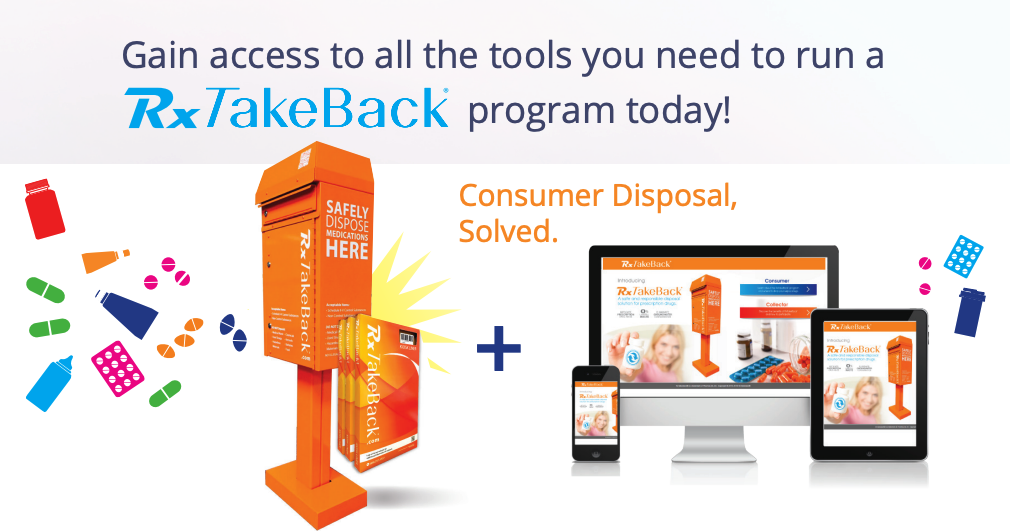Below are a few frequently asked questions (FAQs), if you do not see an answer for the issue you have, please call us at (800) 257-3527 and our expert staff will guide you in the right direction.
Frequently Asked Questions
Whether you are interested in becoming a collector or you are already running a program, we want to be sure to set up your team for success!
FAQ
We’re here to answer your collection questions.
DEA law states:
Collectors shall only allow ultimate users and other authorized non-registrant persons in lawful possession of a controlled substance in Schedule II, III, IV, or V to deposit such substances in a collection receptacle at a registered location. Collectors shall not permit an ultimate user to transfer such substance to any person for any reason. Once a substance has been deposited into a collection receptacle, the substance shall not be counted, sorted, inventoried, or otherwise individually handled.
Yes. Awesome! Your facility may maintain a consumer pharmaceutical return kiosk! DEA regulations state: (a) Collectors or Federal, State, tribal, or local law enforcement may manage and maintain collection receptacles for disposal.
No. If you are not considered one of these businesses, and would like to have a kiosk in your facility, please contact your local DEA facility to learn how to obtain a kiosk at your location.
Although it would be difficult to know if the person that is depositing drugs is the actual owner of their possessions DEA law states:
Collectors shall only allow ultimate users and other authorized non-registrant persons in lawful possession of a controlled substance in Schedule II, III, IV, or V to deposit such substances in a collection receptacle at a registered location. Collectors shall not permit an ultimate user to transfer such substance to any person for any reason. Once a substance has been deposited into a collection receptacle, the substance shall not be counted, sorted, inventoried, or otherwise individually handled.
No.
Collectors shall not permit an ultimate user to transfer such substance to any person for any reason. Once a substance has been deposited into a collection receptacle, the substance shall not be counted, sorted, inventoried, or otherwise individually handled.
Collection receptacles shall be securely placed and maintained:
(1) Inside a collector’s registered location, inside law enforcement’s physical location, or at an authorized long-term care facility;
(2) At a registered location, located in the immediate proximity of a designated area where controlled substances are stored and at which an employee is present (e.g., can be seen from the pharmacy counter). Except as follows:
(i) At a hospital/clinic: A collection receptacle shall be located in an area regularly monitored by employees, and shall not be located in the proximity of any area where emergency or urgent care is provided;
(ii) At a narcotic treatment program: A collection receptacle shall be located in a room: That does not contain any other controlled substances and is securely locked with controlled access;
(iii) At a long-term care facility: A collection receptacle shall be located in a secured area regularly monitored by long-term care facility employees.
DEA states: (A collection receptacle shall be located in a room) that does not contain any other controlled substances and is securely locked with controlled access.
(1) Be securely fastened to a permanent structure so that it cannot be removed;
(2) Be a securely locked, substantially constructed container with a permanent outer container and a removable inner liner as specified in § 1317.60 of this chapter;
(3) The outer container shall include a small opening that allows contents to be added to the inner liner, but does not allow removal of the inner liner’s contents;
(4) The outer container shall prominently display a sign indicating
that only Schedule II–V controlled and non-controlled substances, if a collector chooses to commingle substances, are acceptable substances (Schedule I controlled substances, controlled substances that are not lawfully possessed by the ultimate user, and other illicit or dangerous substances are not permitted).
Collectors shall only allow ultimate users and other authorized non-registrant persons in lawful possession of a controlled substance in Schedule II, III, IV, or V to deposit such substances in a collection receptacle at a registered location. Collectors shall not permit an ultimate user to transfer such substance to any person for any reason. Once a substance has been deposited into a collection receptacle, the substance shall not be counted, sorted, inventoried, or otherwise individually handled.
Manufacturers, distributors, reverse distributors, narcotic treatment programs, hospitals/clinics with an onsite pharmacy, and retail pharmacies that desire to be collectors shall modify their registration to obtain authorization to be a collector in accordance with § 1301.51 of this chapter. Authorization to be a collector is subject to renewal. If a registrant that is authorized to collect ceases activities as a collector, such registrant shall notify the Administration in accordance with § 1301.52(f) of this chapter.


